|
Printables |
PowerPoints |
Online exercises |
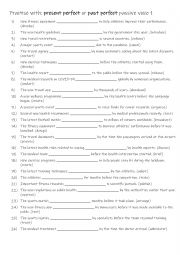
|
B1-B2 Practise with present perfect or past perfect passive voice 1
Students should learn to practise the present perfect and past perfect passive voice because these structures are vital for expressing completed actions with emphasis on the results rather than the doer. The present perfect passive (e.g., "The work has been finished") is used to discuss actions that affect the present, while the past perfect passiv...
Level: intermediate
Age: 10-100
Type:
Downloads: 115
|
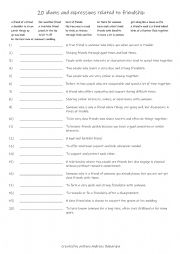
|
20 Idioms and expressions related to friendship B2-C1 (1)
Learning friendship-related idioms helps students improve their communication by making their language sound more natural and fluent. It broadens their vocabulary, allowing them to express emotions and relationships more effectively. These idioms also deepen cultural understanding and foster stronger connections, as they reflect shared social value...
Level: intermediate
Age: 12-100
Type:
Downloads: 115
|
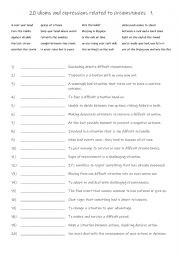
|
B1+-C1 20 idioms and expressions related to circumstances 1
First, students need to familiarise themselves with the 20 idioms and expressions and their meanings. Then they read the definitions to see which one is being described and write that word in the space provided Answers on page 2.
Level: intermediate
Age: 11-100
Type:
Downloads: 115
|
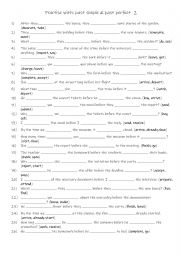
|
A2-B1 Practise with past simple & past perfect 2
First, students need to familiarise themselves with the 2 tenses and their use. Then they read the sentences to see which tense is required to complete the gap-fill using the given infinitive in (). Each tense is used 13 times! Answers on page 2.
Level: intermediate
Age: 9-100
Type:
Downloads: 115
|
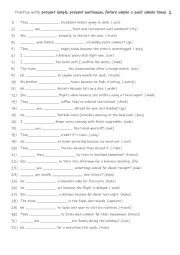
|
A1+-A2 Practise with present simple, present continuous, future simple & past simple tense 2
First, students need to familiarise themselves with the 4 tenses and their use. Then they read the sentences to see which one is needed to complete the sentence using the given infinitive in (). Each tense is used 8 times! Answers on page 2.
Level: elementary
Age: 8-100
Type:
Downloads: 115
|
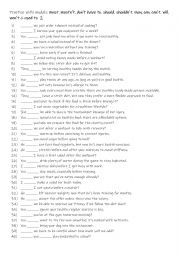
|
A1+-A2 Practise with modals must, mustn�t, don�t have to, should, shouldn�t, may, can, can�t, will, won�t & used to 2
First, students need to familiarise themselves with the modals and their use. Then they read the sentences to see which one is needed to complete the sentence. Answers on page 2.
Level: elementary
Age: 8-100
Type:
Downloads: 115
|
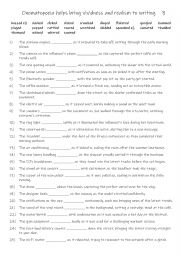
|
B1+-C1 Onomatopoeia helps bring vividness and realism to writing 3
Mastering onomatopoeic words also enhances student�s creativity and ability to connect language with the sounds of the world around them. First, students need to familiarise themselves with the 25 words and their meaning. Then they read the sentences to see which one is needed to complete the gap-fill. Answers on page 2.
Level: intermediate
Age: 13-100
Type:
Downloads: 115
|
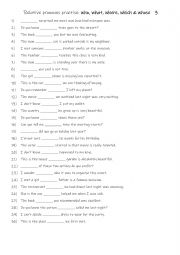
|
A1+-A2 Relative pronouns practise who, what, where, which & whose 3
Mastery of these pronouns also builds grammatical accuracy, making students more confident in formal and informal contexts. First, students need to familiarise themselves with the pronouns and their use. Then they read the sentences to see which one is needed to complete the sentence. Answers on page 2.
Level: elementary
Age: 9-100
Type:
Downloads: 115
|
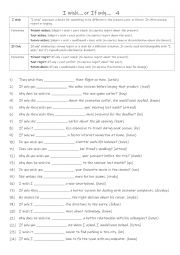
|
B1-B2 I wish�. or If only�. 4
First, students need to familiarise themselves with the 2 patterns and their use. Then they read the sentences to work out which tense is needed to complete the gap-fill using the infinitive in (). Each pattern is used 12 times! Answers on page 2
Level: intermediate
Age: 10-100
Type:
Downloads: 115
|
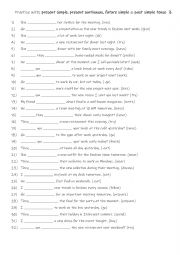
|
A1+-A2 Practise with present simple, present continuous, future simple & past simple tense 3
Students should learn and practice the present simple, present continuous, future simple, and past simple tenses at the A1+-A2 level because these tenses are essential for everyday communication, such as discussing routines, ongoing activities, past events, and simple future plans. They provide a solid foundation for learning more advanced grammar ...
Level: elementary
Age: 8-100
Type:
Downloads: 115
|
|
|
|
|












